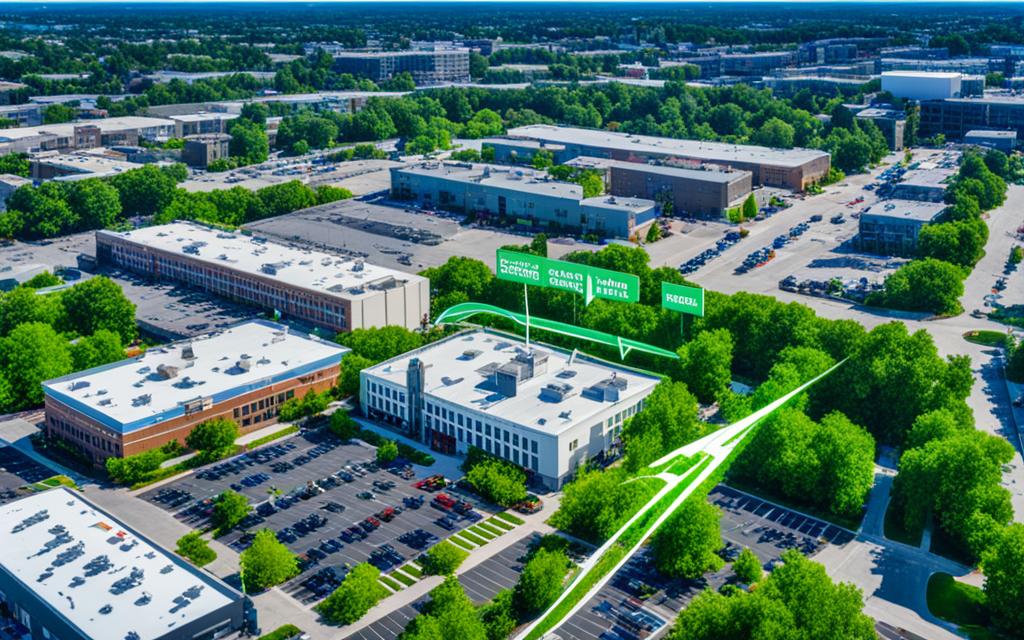Delving into the world of commercial real estate unveils a spectrum of lucrative investment opportunities. This sector distinguishes itself with its potential for significant financial rewards and its attraction for those with a keen eye on maximizing earnings.
As a professional within the realm of commercial property, one must navigate a landscape of complex transactions and represent an array of clients that range from private equity moguls to REITs. In the United States, the average earnings for a CRE broker reflect the expertise required, boasting figures that can veer between $84,026 and $112,230 annually.
The vibrancy of this market is most palpable in top-tier cities like Denver, New York, Los Angeles, Atlanta, and Chicago where the stakes are as towering as the skyscrapers that define their skylines. A journey into a career in commercial real estate starts with the fundamentals—the acquisition of a real estate license, which entails a commitment to comprehensive state-specific coursework and the successful passing of a meticulous state exam.
Networking is the cornerstone of success in this domain, with organizations like the ICSC, BOMA International, CCIM, NAR, NAIOP, SIOR, NMHC, and CREW Network providing invaluable platforms for connection and growth. Furthermore, affiliating with top-tier brokerage powerhouses such as CBRE and Cushman & Wakefield can serve as robust catalysts for a thriving career in the commercial quadrant of real estate.
Commercial Real Estate: A Pathway to Prosperity
Navigating the world of commercial real estate offers a promising avenue towards financial growth and stability. With a diverse range of commercial investment properties at your disposal, understanding the market’s complexities becomes paramount.
Understanding the Dynamics of Commercial Property
The dynamism that characterizes commercial estate mandates a comprehensive grasp of the various asset classes. This includes well-identified sectors such as medical offices, which are vastly different in their lease structure and tenant expectations from, say, mixed-use developments which combine residential living with retail space for lease.
Breaking Down the Different Commercial Property Types
Commercial real estate embodies multiple property types each with their unique market demands. Office space rental catered to corporate clients, industrial real estate geared towards manufacturing and logistics, and commercial leasing in busy retail corridors represent just a glimpse of this sector’s wide array. Success hinges on an agent’s adeptness in maneuvering through these varied landscapes.
Essential Skills for Thriving in Commercial Leasing and Sales
For those specializing in commercial leasing and sales, it is not just about knowledge, but also the development of vital skills. Strong networking capabilities, an in-depth understanding of commercial real estate listings, and the finesse of effective marketing strategies serve as the bedrock for carving out a lucrative niche in the world of commercial investment properties
Career Prospects in the Commercial Real Estate Industry

The allure of a career in commercial real estate is not unwarranted, given its potential for higher earnings and the thrill of high-stakes transactions that define the industry. For many professionals, the quest to find the right commercial property for sale not only fuels their passion but also pads their wallets more substantially than residential sales. The average base salary for a commercial real estate broker in the United States can be quite attractive, often significantly surpassing the earnings of their residential counterparts.
Opportunities within commercial real estate companies are ripe for the taking, with roles that cater to various interests and skills, from sales and leasing to analysis and management. Whether one is intrigued by the complex logistics of commercial property sales or the strategic maneuvering behind multi-unit leases, this field presents an array of choices for aspiring professionals.
| Career Path | Description | Average Salary | Company Examples |
|---|---|---|---|
| Commercial Broker | Specializes in the sale, lease, or purchase of commercial properties. | $100,000+ | CBRE, Cushman & Wakefield |
| Property Manager | Oversees the operations of commercial properties, ensuring efficiency and tenant satisfaction. | $80,000 – $95,000 | Jones Lang LaSalle, Colliers International |
| Real Estate Analyst | Conducts market analysis and financial modeling to support real estate transactions and investment strategies. | $70,000 – $85,000 | Eastdil Secured, Marcus & Millichap |
| Leasing Consultant | Facilitates the leasing of commercial spaces, advising clients on market conditions and lease terms. | $50,000 – $65,000 | Newmark Knight Frank, Savills Studley |
Embarking on one of these careers in commercial real estate may appear daunting at the outset, yet leading firms such as CBRE and Cushman & Wakefield provide foundational support and vast networks. These resources are invaluable for anyone striving to carve their niche within the bustling commercial landscape. Moreover, as urban development continues to thrive and businesses seek new or expanded spaces, the demand for experienced commercial real estate professionals remains robust, ensuring that the pursuit of such careers is not only fulfilling but also holds a promise for longevity and growth.
Commercial Investment Properties: Enhancing Your Portfolio
Investing in commercial property involves scrutinizing various factors that can directly impact the profitability and sustainability of an investment portfolio. Savvy investors pay close attention to market trends, zoning laws, and the fiscal health of their selected regions. Acquisition of commercial investment properties is not merely about buying real estate; it is about identifying opportunities that align with long-term investment strategies and market cycles.
Evaluating the Viability of Commercial Investments
The viability of commercial investments leans heavily on comprehensive market analysis and a discerning approach to economic indicators. Experienced investors will delve into factors such as occupancy rates, average rents, and the quality of the tenant covenants. By understanding and anticipating the unique aspects of each commercial real estate sector, investors can make informed decisions that factor in current trends and future growth potential.

Top Cities for Commercial Real Estate Success
Not all markets are created equal when it comes to commercial real estate success. Metropolitan cities like Denver, New York, Los Angeles, Atlanta, and Chicago are often on the radar of investors seeking to capitalize on vibrant economies and a robust pool of tenants. These cities demonstrate a consistent demand for commercial property, making them lucrative hubs for both established and emerging investors.
How Economic Cycles Influence Commercial Property Investments
Economic cycles play a pivotal role in shaping the landscape of commercial real estate investment. Recognizing the phase of the economic cycle — whether it’s expansion, peak, contraction, or trough — can guide investment strategies. For instance, during expansion, investors might focus on acquisition to leverage rising property values, whereas during contraction, the emphasis might shift to preserving capital and seeking opportunities to buy at lower prices. By aligning strategies with these cycles, investors can optimize the timing of their transactions and make the most of market conditions.
Strategies for Effective Commercial Real Estate Listings
To thrive in the competitive market of commercial real estate, agents must deploy innovative strategies that enhance the online visibility and appeal of their commercial property for sale. Successful commercial real estate listings are the culmination of sharp marketing acumen, deep knowledge of the digital environment, and the agent’s commitment to detail and authenticity. In this digital era, optimizing a listing goes beyond basic advertisement; it becomes a pivotal aspect of the commercial real estate selling process.
Optimizing Listings for Maximum Visibility
Optimization is key to ensuring that commercial real estate listings garner the attention they deserve. Adequate use of SEO tactics, such as integrating specific keywords like ‘commercial property for sale’ and ‘commercial real estate listings,’ can significantly improve a property’s searchability online. High-quality photographs, detailed descriptions, and accurate metadata are all essential elements of a listing that stands out. Emphasizing unique selling points of the property can also attract and retain the interest of potential buyers or tenants.
Navigating the Digital Landscape of Property Listings
The platforms chosen for listing commercial real estate can also dictate the level of engagement a property receives. Modern agents must be proficient in choosing the right mix of commercial real estate platforms that boast high traffic and are frequented by serious investors and corporate decision-makers. The agent’s capability to present commercial real estate listings across a vast digital landscape, including social media, plays a significant role in reaching a wider audience.

Importance of Accurate Representation in Listings
Integrity is fundamental in commercial property listings. Accurate representation of the commercial property for sale not only complies with legal standards but also fosters trust with prospective clients. Misrepresentation can lead to mistrust and potential legal issues, tarnishing an agent’s reputation and harming long-term success. Clear, truthful depictions of the properties’ features, limitations, and potential, allow for informed decision-making, serving both the seller’s and buyer’s best interests.
Buying and Selling: Navigating the Commercial Property Market
The commercial real estate market is a complex, evolving arena where savvy investors and detail-oriented sellers converge. With a critical eye on the commercial property for sale listings, one recognizes that each transaction encapsulates a myriad of financial, regulatory, and market-based variables.

To succeed in this sophisticated marketplace, one needs to develop a comprehensive approach to understand and leverage the deeply interconnected aspects of property valuation, negotiation techniques, and transaction structuring. Market analysis becomes a key tool in this regard, proving indispensable for both buyers and sellers aiming to achieve favorable outcomes in commercial dealings.
Below is a comparative analysis of some critical factors affecting the buying and selling processes in the commercial real estate sector:
| Factor | Impact on Buyers | Impact on Sellers |
|---|---|---|
| Market Demand | Determines the availability and competitive pricing of properties | Can leverage for better negotiating power on price |
| Economic Indicators | Guides future value projections and investment timing | Impacts perceived value and can hasten or delay sale |
| Interest Rates | Affects cost of borrowing and investment returns | Influences buyer’s financing options and sale price |
| Regulatory Changes | Can impact the feasibility and costs of acquisition | Requires adaptability to maintain compliance and marketability |
In a market where properties range from office complexes and retail spaces to industrial estates and multi-unit residences, both sides of the commercial property for sale spectrum require proficient negotiation skills and a strategic mindset tailored to the nuances of the commercial real estate market.
Commercial Property for Sale: Trends and Market Analysis
Investing in commercial real estate requires a keen eye for market trends and an analytical approach to the data driving the industry. For those interested in commercial properties for sale, partaking in comprehensive market analysis offers a lens through which future opportunities and potential risks can be assessed with greater accuracy. Such due diligence is not just recommended; it’s a cornerstone practice among savvy investors who understand the volatility and the various economic indicators that influence commercial real estate.
Recent market trends have underscored the importance of location, with certain regions displaying more resilience and potential for growth, while others face challenges stemming from economic turnarounds and shifting industry demands. Property valuation, rental yields, and vacancy rates are just a few of the factors that must be embraced when conducting a commercial real estate analysis. Investors must interpret these signs, considering global economic conditions, local market saturation, and infrastructure developments, which can all have profound effects on the commercial property market landscape.
Foresight in real estate investing, particularly in the commercial sector, is heavily reliant on recognizing and understanding market trends. As trends provide a trajectory of where the market could be headed, professionals in the field are expected to parse through past and current data to anticipate these movements. This active engagement with market analysis is central to identifying commercial properties for sale that are not only valuable in the present but promise continued or increasing worth as the market evolves.
FAQ
What are the investment opportunities in commercial real estate?
Investment opportunities in commercial real estate vary from purchasing and leasing office spaces, retail units, industrial warehouses, to investing in apartment buildings. Each asset class comes with its unique set of benefits and risks, offering investors a chance to diversify their portfolios, generate steady income through rentals, or realize capital appreciation over time.
How can one thrive in commercial leasing and sales?
Thriving in commercial leasing and sales requires a combination of skills, including deep knowledge of specific asset classes, strong networking abilities, and robust marketing tactics. Specializing in a niche market, effectively leveraging commercial real estate listings, and understanding client needs are pivotal for success in this competitive industry.
What are some career prospects in the commercial real estate industry?
Career prospects in the commercial real estate industry range from becoming a sales agent or broker to a property manager, commercial appraiser, or investment analyst. Careers could also extend into related fields such as commercial real estate finance and development. Success in these careers often depends on education, networking, and experience within the commercial sector.
What factors should be evaluated when considering commercial investment properties?
When considering commercial investment properties, factors such as location, market demand, tenant quality, lease terms, property condition, and potential for appreciation should be evaluated. Additionally, understanding market dynamics, economic indicators, and the impact of economic cycles on property values is essential for making informed investment decisions.
How can commercial real estate listings be optimized for maximum visibility?
To optimize commercial real estate listings for maximum visibility, it’s important to use high-quality photography, detailed property descriptions, and precise location data. Strategic marketing through multiple channels, including online platforms, industry networks, and traditional media, plays a crucial role in ensuring listings reach the widest possible audience of suitable investors or lessees.
What are the current market trends in commercial property for sale?
Current market trends in commercial property for sale include a growing interest in industrial real estate due to e-commerce growth, the adaptation of retail spaces to experience-driven businesses, and a renewed focus on flexibility in office space design. Additionally, investor interest in mixed-use developments continues to rise as these properties can offer diversified income streams.
How do economic cycles influence commercial property investments?
Economic cycles can significantly influence commercial property investments by affecting property values, rental demand, and occupancy rates. During a booming economy, commercial properties might see increased demand and higher rents, while during a recession, tenants may seek to renegotiate leases, and vacancy rates could rise. Investors must consider these cycles to time their investment activities appropriately.
What are the top cities for commercial real estate success?
The top cities for commercial real estate success typically include major metropolitan areas with diverse economies, like New York, Los Angeles, Chicago, Atlanta, and Denver. These cities offer robust markets due to their size, economic growth, and concentration of businesses, making them attractive for a variety of commercial real estate investments.
How important is accurate representation in commercial real estate listings?
Accurate representation in commercial real estate listings is vital for building trust with clients, complying with regulations, and ensuring that potential investors and lessees can make informed decisions. Inaccuracies or omissions can lead to legal issues, damage reputation, and negatively impact the transaction process.
What are the essential skills for navigating the digital landscape of property listings?
Essential skills for navigating the digital landscape of property listings include digital marketing proficiency, search engine optimization (SEO) knowledge for increasing online visibility, the ability to analyze web traffic and leads, and familiarity with various listing platforms and technologies that enhance the property’s presentation to a digital audience.
Source Links
- https://www.linkedin.com/pulse/exploring-commercial-real-estate-personalized-colonial-i60rc
- https://www.crexi.com/insights/exploring-careers-in-commercial-real-estate
- https://www.adventuresincre.com/optionality-in-commercial-real-estate/



